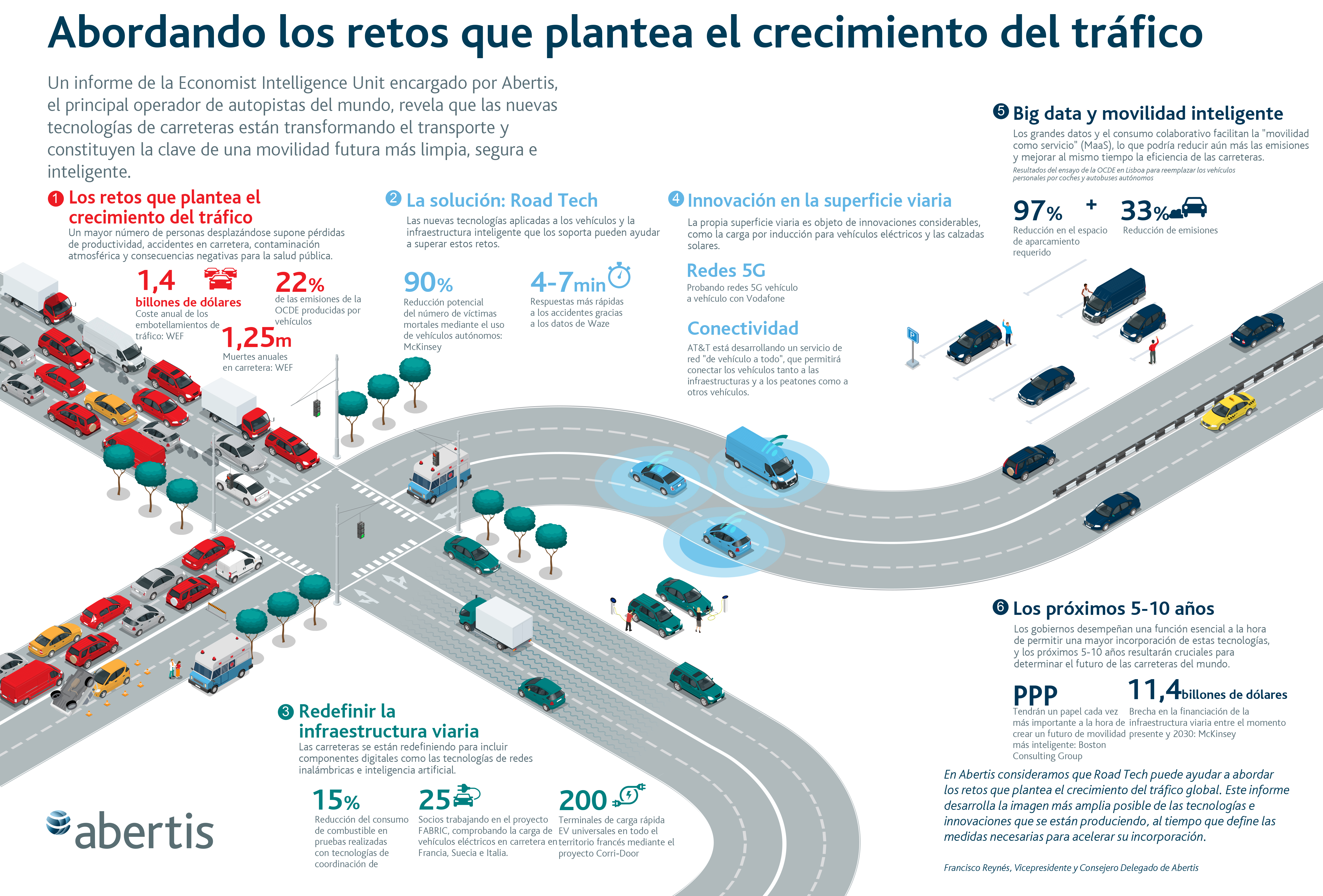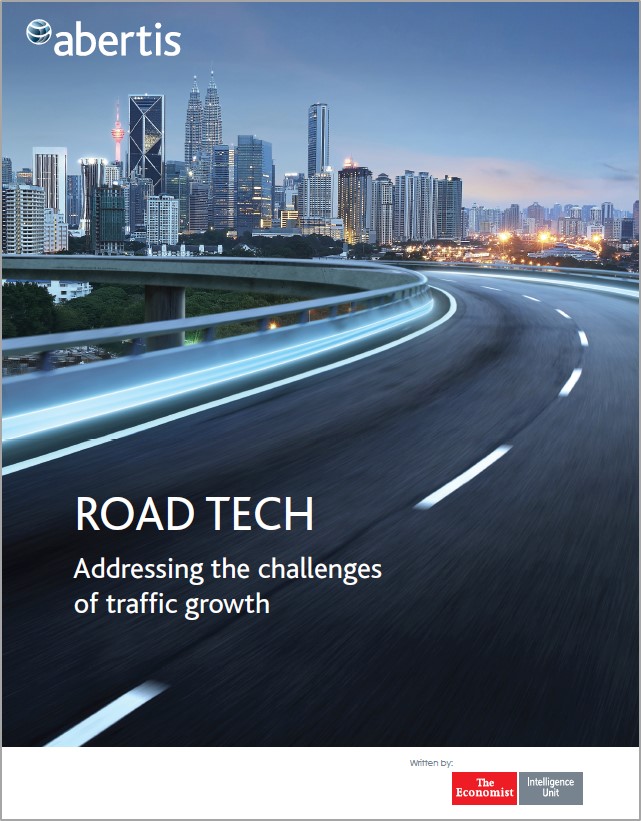New report by the Economist Intelligence Unit, commissioned by Abertis: Road Tech key to tackling challenges of global traffic growth
- New road technologies are transforming transport – and hold the key to a cleaner, safer and smarter mobility future
- Governments have a pivotal role to play in enabling greater adoption of these technologies – and the next 5-10 years will be crucial in determining the future of the world’s roads.
A report released today by The Economist Intelligence Unit and commissioned by Abertis found that new road technologies are transforming transport – and hold the key to a cleaner, safer and smarter mobility future.
Global traffic is growing as economies around the world expand. But that growth brings economic and social challenges – like the lost productivity associated with gridlock, deaths from accidents on the road, air pollution, and climate change.
Connected, autonomous, and electric cars are becoming a reality, and could tackle some of those challenges. But we won’t unlock their true potential unless innovation in road infrastructure keeps pace with the advances in vehicle technologies. Road Tech can be the platform for the future of mobility, as both the road surface and infrastructure are redefined to include digital components, wireless networks and sensors, and electric vehicle charging technology.
A cleaner, safer and smarter mobility future
Abertis CEO and Vice Chairman Francisco Reynés commented: “At Abertis we believe that tackling the challenges of global traffic growth means working at the intersection of technology advances and road infrastructure innovation. That is why we commissioned this report, to develop the most comprehensive overview of the technologies and innovations coming through – and to establish what’s needed to accelerate their adoption”.
‘Road Tech: Addressing the challenges of traffic growth’, released today in Barcelona, is based on in-depth interviews with leading experts from infrastructure, tech and transport experts across sectors and geographies. The report is part of the company’s long-term commitment to create a smarter, cleaner and safer mobility future, by working in partnership with governments and innovators to accelerate new technologies and realise their full potential.

Detailed findings of report
Growing traffic is resulting in productivity losses, road accidents, air pollution and an adverse impact on public health.
- WEF estimates that there will be a 600 million increase in the number of cars on the road between 2014 and 2025. It also estimates that the current annual global cost for lost productivity in traffic jams is US$1.4 trillion.
- 1.25m people die each year on the road, according to the World Health Organisation.
- 22% of OECD CO2 emissions and 1/3 of fine particulate matter in urban areas comes from vehicles – causing heart attacks, strokes and respiratory illness.
New road technologies give us the chance to overcome some of these challenges.
- Autonomous vehicles could reduce fatalities by 90%, according to McKinsey. But they will only work with smart infrastructure to guide them.
- Data from services like Waze, an Abertis partner through the “Connected Citizens Program”, is already helping first responders get to the scene of an accident between 4 and 7 minutes earlier, a potentially life-saving difference.
- Trials of signal co-ordination technologies in Texas are reducing fuel consumption by 15%.
That’s why road infrastructure is being redefined to include digital components like wireless network technologies and AI.
- Current tests include Vodafone’s vehicle-to-vehicle communication over a fifth-generation (5G) network. Trials are under way in the UK and Germany.
- AT&T is working to provide vehicle-to-everything network service, which will allow vehicles to communicate not just with other cars but with infrastructure and pedestrians as well.
Big data and the sharing economy are facilitating “mobility as a service” (MaaS), which could further reduce emissions while increasing road efficiency.
- MaaS has the potential to move more people and goods in ways that are faster, cleaner and less expensive than current options.
- An OECD trial in Lisbon suggested that replacing personal vehicles with shared autonomous cars and buses would reduce emissions by one-third and cut required parking space by 97%.
- The Whim app developed by Finnish start-up MaaS Global maps a traveller’s journey from door to door, enlisting a combination of public and private modes of transport.
The road surface itself is the focus of considerable innovation, like inductive charging for electric vehicles and solar roads.
- Car manufacturers are gradually shifting away from the traditional internal combustion engine towards electric propulsion systems, including fully electric vehicles and hybrids.
- Their adoption will be accelerated by installing fast-charging stations along motorways. There are also trials of inductive lane charging and solar roads:
- The EU-funded FABRIC project—a consortium of 25 partners, including Abertis/Sanef, Volvo and Scania—is a feasibility analysis of on-road electric vehicle charging technologies across test sites in France, Sweden and Italy.
- In December 2016, the world’s first solar-panel road opened in Tourouvre-au-Perche in Normandy, France. The 1 km road cost the French government US$5.5m and has been set up to power streetlights in the village.
Governments have a pivotal role to play in enabling greater adoption of these technologies – and the next 5-10 years will be crucial in determining the future of the world’s roads.
- Clear policymaking is needed to guide the development of common standards for intelligent infrastructure, alongside frameworks for data sharing and cybersecurity.
- McKinsey estimates that the road infrastructure funding gap stands at around US$11.4trn from now until 2030. Public-Private Partnerships will play an increasingly important role in filling that gap, according to Boston Consulting Group.
Download full Road Tech Report
Know more about Abertis' Road Tech program
Share
Related news
Abertis extends its concession in Rio de Janeiro until 2047
12 November 2025
•The operator wins the tender to continue operating Autopista Fluminense with a new contract that includes an investment plan (aprox. 500 million euros over seven years) to improve mobility and a tariff adjustment as a result of the new investments, along with a 21-year extension.
•José Aljaro, CEO of Abertis, highlighted that “this operation represents a key opportunity for Abertis by extending a strategic asset and strengthening our position as a leader in Brazil, where we manage more than 3,000 kilometers of highways, a significant part of Abertis’ total network of 8,000.”
•Arteris, Abertis’ subsidiary in Brazil, has been the largest investor in the federal highway concession program in the last decade.
Abertis successfully places a €250 million hybrid bond issue
21 October 2025
•The issue has been successfully placed with a book of more than 5 times oversubscribed among circa 100 institutional investors.
•The transaction was closed with a yield of 4.375%, which represents a lower cost than the last issuance in May.
•This issue reaffirms the market's confidence in the company's financial strength, maintaining its commitment to its rating and demonstrating active management of its balance sheet.

